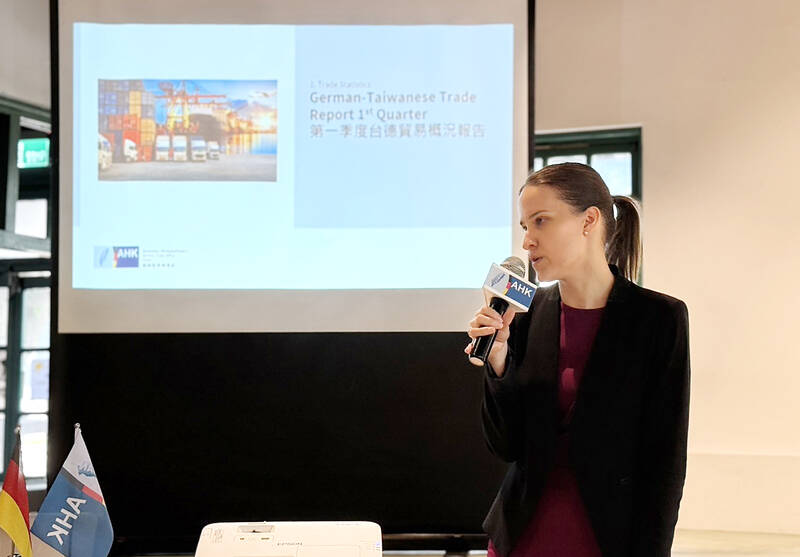The German Trade Office Taipei yesterday pressed for closer trade ties with Taiwan, calling Taiwan a stable market and local firms reliable partners amid rising global uncertainty linked to US tariff challenges.
“In today’s uncertain global environment, companies value reliable partners and stable markets more than ever,” the trade office said in a report. “Taiwan is exactly such a market and we will continue fostering bilateral exchange and advancing Germany-Taiwan economic cooperation to new heights.”
The office last month conducted a survey to assess the impact of global political developments on business strategies, with a focus on the implications of the German federal election and the return of US President Donald Trump to the White House.

Photo: CNA
Most German businesses in Taiwan reported limited direct effects from the German election, and many expressed hope that the new government would strengthen economic and investment ties with Taiwan.
By contrast, US trade policies under Trump have raised concern, as more than 50 percent of companies said they expect a negative impact on their operations and more than 30 percent were considering supply chain adjustments, it said.
Another 25 percent plan to bolster cooperation with Taiwanese partners to diversify risk, the trade office said.
German Trade Office Taipei Chief Representative and Executive Director Eva Langerbeck said she observed strong interest from German companies in the Taiwanese market, especially in areas such as aerospace, energy, transportation and smart cities.
According to the Ministry of Finance, bilateral trade between Taiwan and Germany was US$5 billion in the first quarter of this year, a 2 percent increase year-on-year, the office said.
Taiwan’s main exports to Germany were information and communications technology, electronic parts, audio-video products, vehicles, aircraft and vessels, while Germany’s major imports to Taiwan included chemicals, vehicles, aircraft, vessels and electronic parts, it said.
Notably, imports of optical and precision instruments, clocks and watches saw a 55 percent year-on-year growth, reflecting the strong complementarity of Taiwan’s and Germany’s industrial structures, the office said.
Taiwan’s approved direct investment in Germany totaled nearly US$490 million last year, it said, adding that although the figure was lower than the record-breaking Taiwan Semiconductor Manufacturing Co (台積電) project in 2023, it far exceeded historical averages, demonstrating growing interest from Taiwanese companies in the German market.
One of the highlights was Walsin Lihwa Corp’s (華新麗華) acquisition of a century-old German seamless stainless steel tube manufacturer, a sign of Taiwanese investment diversifying beyond semiconductors and into high-end manufacturing, the office said.
The office said it also facilitated five industry delegations from Germany to Taiwan last year, covering themes such as electric-mobility, two-wheelers, leisure and smart machinery.

WEAKER ACTIVITY: The sharpest deterioration was seen in the electronics and optical components sector, with the production index falling 13.2 points to 44.5 Taiwan’s manufacturing sector last month contracted for a second consecutive month, with the purchasing managers’ index (PMI) slipping to 48, reflecting ongoing caution over trade uncertainties, the Chung-Hua Institution for Economic Research (CIER, 中華經濟研究院) said yesterday. The decline reflects growing caution among companies amid uncertainty surrounding US tariffs, semiconductor duties and automotive import levies, and it is also likely linked to fading front-loading activity, CIER president Lien Hsien-ming (連賢明) said. “Some clients have started shifting orders to Southeast Asian countries where tariff regimes are already clear,” Lien told a news conference. Firms across the supply chain are also lowering stock levels to mitigate

IN THE AIR: While most companies said they were committed to North American operations, some added that production and costs would depend on the outcome of a US trade probe Leading local contract electronics makers Wistron Corp (緯創), Quanta Computer Inc (廣達), Inventec Corp (英業達) and Compal Electronics Inc (仁寶) are to maintain their North American expansion plans, despite Washington’s 20 percent tariff on Taiwanese goods. Wistron said it has long maintained a presence in the US, while distributing production across Taiwan, North America, Southeast Asia and Europe. The company is in talks with customers to align capacity with their site preferences, a company official told the Taipei Times by telephone on Friday. The company is still in talks with clients over who would bear the tariff costs, with the outcome pending further

Six Taiwanese companies, including contract chipmaker Taiwan Semiconductor Manufacturing Co (TSMC, 台積電), made the 2025 Fortune Global 500 list of the world’s largest firms by revenue. In a report published by New York-based Fortune magazine on Tuesday, Hon Hai Precision Industry Co (鴻海精密), also known as Foxconn Technology Group (富士康科技集團), ranked highest among Taiwanese firms, placing 28th with revenue of US$213.69 billion. Up 60 spots from last year, TSMC rose to No. 126 with US$90.16 billion in revenue, followed by Quanta Computer Inc (廣達) at 348th, Pegatron Corp (和碩) at 461st, CPC Corp, Taiwan (台灣中油) at 494th and Wistron Corp (緯創) at

NEGOTIATIONS: Semiconductors play an outsized role in Taiwan’s industrial and economic development and are a major driver of the Taiwan-US trade imbalance With US President Donald Trump threatening to impose tariffs on semiconductors, Taiwan is expected to face a significant challenge, as information and communications technology (ICT) products account for more than 70 percent of its exports to the US, Chung-Hua Institution for Economic Research (CIER, 中華經濟研究院) president Lien Hsien-ming (連賢明) said on Friday. Compared with other countries, semiconductors play a disproportionately large role in Taiwan’s industrial and economic development, Lien said. As the sixth-largest contributor to the US trade deficit, Taiwan recorded a US$73.9 billion trade surplus with the US last year — up from US$47.8 billion in 2023 — driven by strong